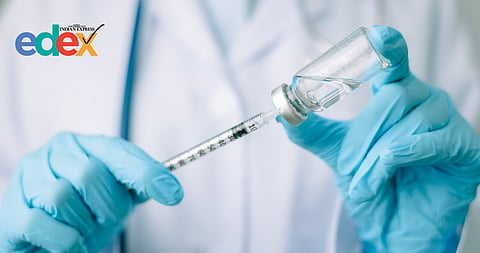

A research team from Andhra University has identified a molecular process that may help the Coronavirus escape the antibodies produced by Covid-19 vaccines, raising concerns about long-term vaccine effectiveness. The discovery was made by researchers working under the guidance of Dr Ravikiran S Yedidi, founder of TCABS-E Laboratories, incubating at Andhra University.
The findings were published in an Elsevier journal on November 19, 2025. The team comprising Manikanta Sodasani, Abhinav VKS Grandhi, Niharikha Mukala, Jahnavi Chintalapati, Madhuri Vissapragada and Madhumita Aggunna, studied the receptor binding domain (RBD) of the SARS-CoV-2 spike protein, which allows the virus to enter human cells by attaching to the ACE2 receptor.
Because Covid-19 vaccines work by generating antibodies that target the RBD, understanding how this region behaves is important for improving protection. According to the study, the RBD undergoes liquid-liquid phase separation (LLPS), a transition between solid-like and liquid-like states, forming droplet-like clusters in laboratory tests.
This creates molecular crowdedness, making it harder for antibodies to recognise, and bind to the virus. The team suggests that this behaviour may help the virus hide from immune system even in vaccinated people.
To support this observation, the researchers carried out 500-nanosecond molecular dynamics simulations, showing that the RBD acts as an intrinsically disordered protein (IDP). These flexible and unstable regions overlap with both antibody-binding sites, and the ACE2 receptor binding surface, indicating that structural flexibility and LLPS together may block the antibodies, and favour viral entry into cells. The authors point out that current vaccines are developed based on the stable form of the spike protein.
If the immune system is not trained to recognise the RBD in its phase-separated form, it may not produce antibodies that work well during real infection, which may explain why some variants continue to infect vaccinated individuals.
Dr Yedidi noted that developing improved vaccines may require the combined support of artificial intelligence, quantum computing and biotechnology. On this occasion, Andhra University Vice-Chancellor Prof GP Raja Sekhar congratulated the research team for their contribution to ongoing Covid-19 research.
